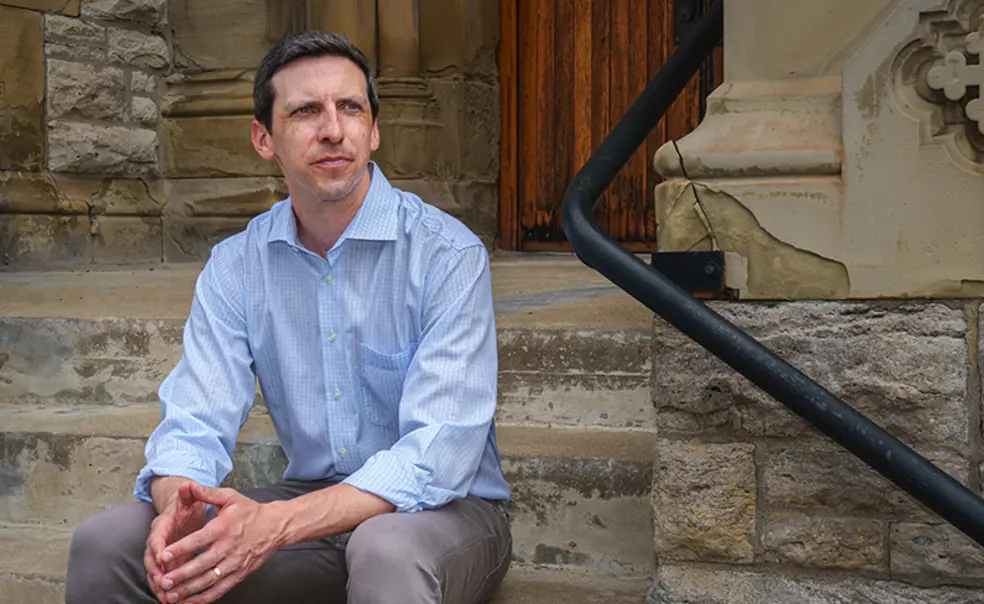Pardoned, P.G. Sittenfeld ’07 Still Wants the Supreme Court to Take His Case
Sittenfeld is asking the justices to block what he calls the criminalization of routine political interactions
Alexander P.G. Sittenfeld ’07 is still battling to clear his name even after an unexpected pardon from President Donald Trump in May removed him from further legal penalties: On Friday afternoon, July 11, the former Cincinnati City Council member filed paperwork asking the Supreme Court to review his 2022 bribery conviction.
It’s a highly unusual move. Sittenfeld’s lawyers have found no other example of someone receiving a presidential pardon and still appealing to the Supreme Court, according to Sittenfeld.
“An item that people don’t typically envision going on their résumé? Supreme Court petitioner,” he wrote in a LinkedIn post Friday afternoon shortly after the filing, his only public comment on this latest turn in his case. “As of today, I am now one.”
In their petition for a writ of certiorari, Sittenfeld’s pro bono lawyers argue that his pardon — which he “gratefully accepted,” they wrote — did not make the case moot, because he still suffered consequences that should be redressed. His conviction was not vacated, and he had to pay a $40,000 criminal fine. In addition, Cincinnati is trying to recover $80,000 of his council member salary.
Sittenfeld said he is driven by more than personal considerations. “The stakes go far beyond me,” he wrote in his post. “The consequences touch every candidate (and donor) engaged in lawful, constitutionally-protected political conduct. Simply put, I don’t want what happened to me to ever happen to other people who go into public service for good reasons.”
Sittenfeld, a liberal Democrat, was considered a strong favorite to become mayor of Cincinnati when he was caught up in an elaborate FBI sting. A jury convicted him of accepting a $20,000 campaign contribution from an undercover FBI agent posing as a developer. Prosecutors said the contribution was an illegal quid pro quo for supporting a downtown development project. Sittenfeld was sentenced to 16 months in a minimum security federal prison camp.
A three-judge panel of the Sixth Circuit U.S. Court of Appeals ordered him released after serving less than five months, pending his appeal, but ultimately voted 2-1 to uphold his conviction in February. Yet all three judges urged the Supreme Court to take the case and clear up ambiguities in the law. Without the pardon, Sittenfeld could have been sent back to prison unless the Supreme Court overturned his conviction.
The case is unusual — and raises First Amendment concerns, according to his lawyers — especially because the bribe came in the form of a campaign contribution rather than personal enrichment. At issue is the blurry line between a politician who simply states his political priorities to donors and a politician who illegally solicits a bribe from them. In the Supreme Court petition, Sittenfeld’s lawyers — led by Noel Francisco, the solicitor general during Trump’s first term — cite examples of Trump asking oil executives for money during the 2020 campaign while promising to act in their favor, and Hillary Clinton vowing to protect Planned Parenthood during the 2016 campaign while Planned Parenthood promised millions of dollars in campaign support. Sittenfeld’s actions were not meaningfully different from Trump’s or Clinton’s, his lawyers argue. “Without this Court’s intervention, these politicians — and their donors — are all vulnerable to selective prosecution,” they wrote.
A roster of former federal prosecutors, former White House lawyers and former U.S. attorneys general who served in Democratic and Republican administrations going back to President George H.W. Bush signed briefs supporting Sittenfeld’s earlier appeal because, they said, upholding Sittenfeld’s conviction would criminalize routine interactions between politicians and donors.
The Supreme Court could decide whether or not to take the case as soon as late September, according to its calendar.
Meanwhile, Sittenfeld has added a line to his LinkedIn profile to account for his activities from January to May 2024: “Prisoner, Federal Bureau of Prisons, Full-time.”













1 Response
Jonathan Hawgood
6 Months AgoResponse to Pardon Shows Lack of Remorse
This just makes me sick. Don’t ever forget P.G.’s words, caught on tape, to Chin. “But I mean the one thing I will say is like, you know I mean, you don’t want me to like be like, ‘Hey Chin like love you but can’t.’” (And P.G then solicits the “donation” of many thousands of dollars.) It wasn’t just that P.G. was for sale and wanted those with money and ambition to know it, it was that he was suggesting to people who wanted to develop in Cincinnati that they wouldn’t be able to if they didn’t fork over money to him. It is hilariously appropriate that P.G. would be pardoned by DJT. The two have only one thing in common: the willingness to betray the trust the public put in them in order to line their pockets.
I have known P.G. and his family for many years. We come from the same neighborhood and school community. I served on the board of the Library Foundation with his father. That P.G. would try to turn this situation into “I got screwed and I want to fight so that others don’t have to” is all the indication you need that he has no remorse, that he has not recognized the way he failed all of us in this town.
P.G., you should be shutting up right now and thanking your lucky stars that you got pardoned by a man you wouldn’t be willing to walk into a room with.